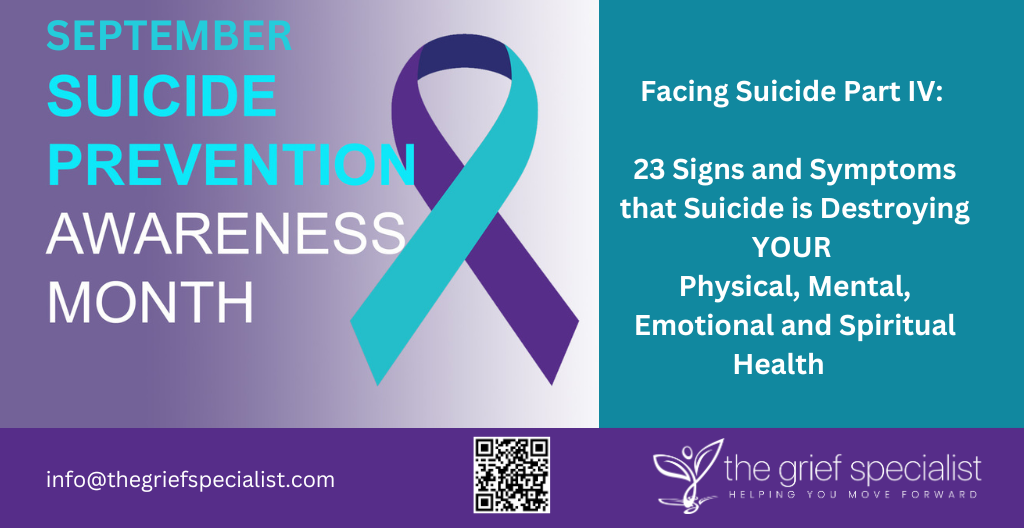23 Signs and Symptoms that Suicide Loss is Destroying Your Health
So far in Parts I – IV of this series, Facing Suicide during Suicide Awareness Month, you learned facts about suicide to help you understand it and relieve yourself of the guilt and shame that goes alone with losing a loved one to suicide. You also learned some very important information about identifying if someone is possibly suicidal. You are now equipped to ask some tough questions and know what to do if someone is suicidal.
Unfortunately, we can’t prevent all suicides and many of us are left in the aftermath of a suicide loss. My son took his life in 2018 and I was in a state of shock that was unbearable. In my time of despair and grief, I turned to doing what I had done before – journaling. However, in the case of my son’s suicide, my journaling was public on Facebook.
My friend Lynn shared this with me after following my social media posts of my heartache, grief and sadness after my son committed suicide:
“I’m taking this opportunity to thank you for sharing your grief journey the way you do. I’ve been hospitalized multiple times after suicide attempts and seeing your raw pain helps remind me how I’d be hurting my loved ones if I ever succumbed. I am in awe of your strength and grace and truly hope sharing your grief is healing to you.”
Lynn
When someone dies, we experience grief. Truly, what is grief?
Grief is the internal thoughts and feelings you have when a loved one dies. It is a strong feeling of sadness. It is natural to experience grief. It is normal to miss a loved one.
Grief has many faces. It is individual, and your grief is no better or worse than another’s. This is not a place or time to compare pain and suffering. It is a journey. Emotions associated with grief are difficult to understand.
Find solace in the fact that being human naturally includes loss and pain. It is a universal experience. No matter what your unique circumstances, you can move through grief to healing. There is hope. However, you are more than likely to encounter a degree of pain and suffering, some of which can be short-term. These short-term signs are called acute grief.
Acute grief is characterized by changes in physical, mental, emotional, and spiritual health.
Symptoms of acute physical grief can include:
- Trouble initiating or maintaining sleep
- Chest heaviness or pain
- Shortness of breath
- Lack of desire to eat
- Headache
- Digestive issues
- Forgetfulness
- Difficulty concentrating
- Slowed thinking
- Wandering aimlessly
- Feeling trance-like
- Prevailing need to retell the story of your loved one’s death
- Fear
- Guilt
- Longing to be with the person who has passed
- Loneliness
- Apathy
- Anger
- Lack of purpose
- Lowered self-esteem
- Withdrawn and isolated
- Negativity
- Inability to forgive




